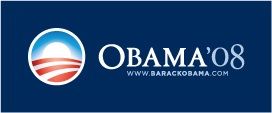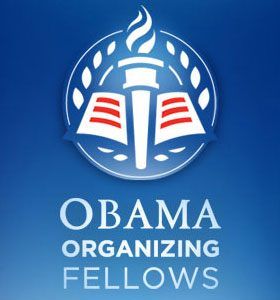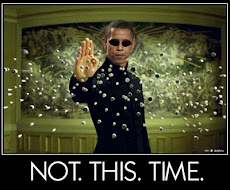What would Martin Luther King say, today?
Martin Luther King - "Why I am opposed to the war in Iraq"
Wake Up
Friday, April 4, 2008
What would Martin Luther King say, today?
Martin Luther King, Jr./I will never forget you
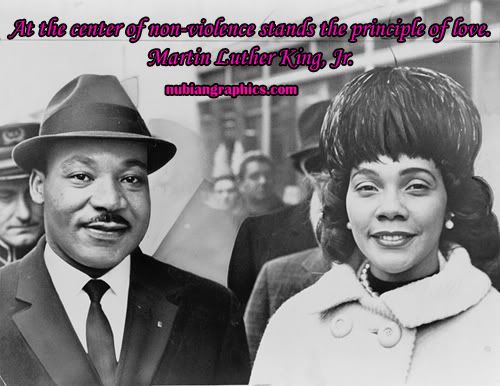
NubianGraphics.com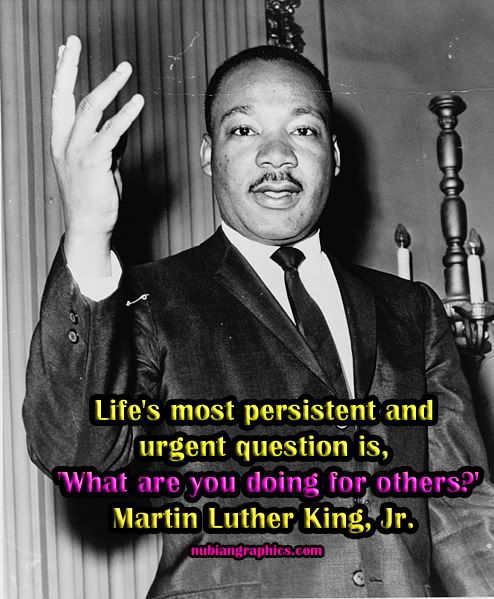
NubianGraphics.com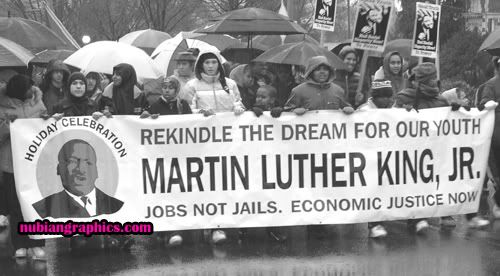
NubianGraphics.com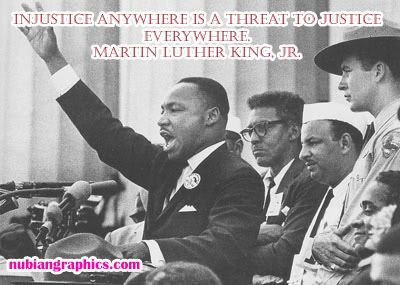
NubianGraphics.com
Martin Luther King, Jr., was born on January 15, 1929, in Atlanta, Georgia. He was the son of Reverend Martin Luther King, Sr. and Alberta Williams King. Although Dr. King's name was mistakenly recorded as "Michael King" on his birth certificate, this was not discovered until 1934, when his father applied for a passport.[citation needed] He had an older sister, Willie Christine (September 11, 1927) and a younger brother, Alfred Daniel (July 30, 1930 – July 1, 1969). King sang with his church choir at the 1939 Atlanta premiere of the movie Gone with the Wind. He entered Morehouse College at age fifteen, skipping his ninth and twelfth high school grades without formally graduating. In 1948, he graduated from Morehouse with a Bachelor of Arts (B.A.) degree in sociology, and enrolled in Crozer Theological Seminary in Chester, Pennsylvania, and graduated with a Bachelor of Divinity (B.D.) degree in 1951. In September 1951, King began doctoral studies in systematic theology at Boston University and received his Doctor of Philosophy (Ph.D.) on June 5, 1955[2] (but see the Plagiarism section for controversy regarding this degree).
Civil rights activism
In 1953, at age 24, King became pastor of the Dexter Avenue Baptist Church in Montgomery, Alabama. On December 1, 1955, Rosa Parks was arrested for refusing to comply with the Jim Crow laws that required her to give up her seat to a white man. The Montgomery Bus Boycott, urged and planned by E. D. Nixon (head of the Montgomery NAACP chapter and a member of the Brotherhood of Sleeping Car Porters) and led by King, soon followed. (In March 1955, a 15 year old school girl, Claudette Colvin, suffered the same fate, but King did not become involved.[3]) The boycott lasted for 381 days, the situation becoming so tense that King's house was bombed. King was arrested during this campaign, which ended with a United States Supreme Court decision outlawing racial segregation on all public transport.
King was instrumental in the founding of the Southern Christian Leadership Conference (SCLC) in 1957, a group created to harness the moral authority and organizing power of black churches to conduct non-violent protests in the service of civil rights reform. King continued to dominate the organization. King was an adherent of the philosophies of nonviolent civil disobedience used successfully in India by Mohandas "Mahatma" Gandhi, and he applied this philosophy to the protests organized by the SCLC. In 1959, he wrote The Measure of A Man, from which the piece What is Man?, an attempt to sketch the optimal political, social, and economic structure of society, is derived.
Attributing his inspiration for non-violent activism to the example of Mahatma Gandhi, he visited the Gandhi family in India in 1959, with assistance from the Quaker group, the American Friends Service Committee (AFSC) and the National Association for the Advancement of Colored People (NAACP). The trip to India affected King in a profound way, deepening his understanding of nonviolent resistance and his commitment to America’s struggle for civil rights. In a radio address made during his final evening in India, King reflected, “Since being in India, I am more convinced than ever before that the method of nonviolent resistance is the most potent weapon available to oppressed people in their struggle for justice and human dignity. In a real sense, Mahatma Gandhi embodied in his life certain universal principles that are inherent in the moral structure of the universe, and these principles are as inescapable as the law of gravitation.” [4]
The FBI began wiretapping King in 1961, fearing that Communists were trying to infiltrate the Civil Rights Movement, but when no such evidence emerged, the bureau used the incidental details caught on tape over six years in attempts to force King out of the preeminent leadership position.
King correctly recognized that organized, nonviolent protest against the system of southern segregation known as Jim Crow laws would lead to extensive media coverage of the struggle for black equality and voting rights. Journalistic accounts and televised footage of the daily deprivation and indignities suffered by southern blacks, and of segregationist violence and harassment of civil rights workers and marchers, produced a wave of sympathetic public opinion that made the Civil Rights Movement the single most important issue in American politics in the early 1960s.
King organized and led marches for blacks' right to vote, desegregation, labor rights and other basic civil rights. Most of these rights were successfully enacted into United States law with the passage of the Civil Rights Act of 1964 and the Voting Rights Act of 1965.
King and the SCLC applied the principles of nonviolent protest with great success by strategically choosing the method of protest and the places in which protests were carried out in often dramatic stand-offs with segregationist authorities. Sometimes these confrontations turned violent. King and the SCLC were instrumental in the unsuccessful Albany Movement in Albany, Georgia, in 1961 and 1962, where divisions within the black community and the canny, low-key response by local government defeated efforts; in the Birmingham protests in the summer of 1963; and in the protest in St. Augustine, Florida, in 1964. King and the SCLC joined forces with the Student Nonviolent Coordinating Committee (SNCC) in Selma, Alabama, in December 1964, where SNCC had been working on voter registration for several months.[5]
On several occasions Martin Luther King Jr. expressed a view that black Americans, as well as other disadvantaged Americans, should be compensated for historical wrongs. Speaking to Alex Haley in 1965, he said that granting black Americans only equality could not realistically close the economic gap between them and whites. King said that he did not seek a full restitution of wages lost to slavery, which he believed impossible, but proposed a government compensatory program of US$50 billion over ten years to all disadvantaged groups. He posited that "the money spent would be more than amply justified by the benefits that would accrue to the nation through a spectacular decline in school dropouts, family breakups, crime rates, illegitimacy, swollen relief rolls, rioting and other social evils."[7] His 1964 book Why We Can't Wait elaborated this idea further, presenting it as an application of the common law regarding settlement of unpaid labor.[8]
Starting in 1965, King began to express doubts about the United States' role in the Vietnam War. In an April 4, 1967, appearance at the New York City Riverside Church — exactly one year before his death — King delivered Beyond Vietnam: A Time to Break Silence. In the speech he spoke strongly against the U.S.'s role in the war, insisting that the U.S. was in Vietnam "to occupy it as an American colony" and calling the U.S. government "the greatest purveyor of violence in the world today." But he also argued that the country needed larger and broader moral changes:“ A true revolution of values will soon look uneasily on the glaring contrast of poverty and wealth. With righteous indignation, it will look across the seas and see individual capitalists of the West investing huge sums of money in Asia, Africa and South America, only to take the profits out with no concern for the social betterment of the countries, and say: "This is not just."[9] ”
King was long hated by many white southern segregationists, but this speech turned the more mainstream media against him. Time called the speech "demagogic slander that sounded like a script for Radio Hanoi", and The Washington Post declared that King had "diminished his usefulness to his cause, his country, his people."
With regard to Vietnam, King often claimed that North Vietnam "did not begin to send in any large number of supplies or men until American forces had arrived in the tens of thousands." King also praised North Vietnam's land reform.[10] He accused the United States of having killed a million Vietnamese, "mostly children."[11]
The speech was a reflection of King's evolving political advocacy in his later years, sparked in part by his affiliation with and training at the progressive Highlander Research and Education Center. King began to speak of the need for fundamental changes in the political and economic life of the nation. Toward the end of his life, King more frequently expressed his opposition to the war and his desire to see a redistribution of resources to correct racial and economic injustice. Though his public language was guarded, so as to avoid being linked to communism by his political enemies, in private he sometimes spoke of his support for democratic socialism:“ You can't talk about solving the economic problem of the Negro without talking about billions of dollars. You can't talk about ending the slums without first saying profit must be taken out of slums. You're really tampering and getting on dangerous ground because you are messing with folk then. You are messing with captains of industry… Now this means that we are treading in difficult water, because it really means that we are saying that something is wrong… with capitalism… There must be a better distribution of wealth and maybe America must move toward a democratic socialism.[12] ”
King had read Marx while at Morehouse, but while he rejected "traditional capitalism," he also rejected Communism because of its "materialistic interpretation of history" that denied religion, its "ethical relativism," and its "political totalitarianism."[13]
King also stated in his "Beyond Vietnam" speech:[14] "True compassion is more than flinging a coin to a beggar; it comes to see that an edifice which produces beggars needs restructuring." From Vietnam to South Africa to Latin America, King said, the U.S. was "on the wrong side of a world revolution." King questioned "our alliance with the landed gentry of Latin America," and asked why the U.S. was suppressing revolutions "of the shirtless and barefoot people" in the Third World, instead of supporting them.
In 1968, King and the SCLC organized the "Poor People's Campaign" to address issues of economic justice. However, according to the article "Coalition Building and Mobilization Against Poverty", King and SCLC's Poor People's Campaign was not supported by the other leaders of the Civil Rights Movement, including Bayard Rustin. Their opposition incorporated arguments that the goals of Poor People Campaign was too broad, the demands unrealizable, and thought these campaigns would accelerate the backlash and repression on the poor and the black.[15]
The campaign culminated in a march on Washington, D.C. demanding economic aid to the poorest communities of the United States. He crisscrossed the country to assemble "a multiracial army of the poor" that would descend on Washington—engaging in nonviolent civil disobedience at the Capitol, if need be—until Congress enacted a poor people's bill of rights. Reader's Digest warned of an "insurrection."
King's economic bill of rights called for massive government jobs programs to rebuild America's cities. He saw a crying need to confront a Congress that had demonstrated its "hostility to the poor"—appropriating "military funds with alacrity and generosity," but providing "poverty funds with miserliness." His vision was for change that was more revolutionary than mere reform: he cited systematic flaws of racism, poverty, militarism and materialism, and that "reconstruction of society itself is the real issue to be faced."[16]

Martin Luther King Day Comments - DazzleJunction.com

Martin Luther King Day Comments - DazzleJunction.com
Celebrating the birth of famous African American Civil Rights Leader at hitupmyspot.com
We Are The Ones We Have Been Waiting For!!!
Help Barack Obama in Pennsylvania, Indiana, North Carolina
You can have a major impact on the race for the Democratic nomination. We need your help to build our movement on the ground.
Join fellow Barack Obama supporters and travel to Pennsylvania, Indiana, North Carolina and volunteer to work for the campaign.
No prior experience is needed. Simply let us know when you can join us and a local organizer will provide you with more information

































